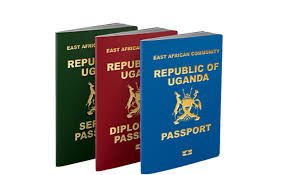The Weight of Identity: A Passport, a Tribe, And a Nation's Shame
Ugandan's struggle with tribal identity and systemic racism: Aisha Najjuma's ordeal at the internal affairs offices

17 Dec, 2024
Share
Save
We don’t lament because we hate this country, but we do so with a paltry hope that things might change, maybe not today, but shortly. Self-seekers and beneficiaries of the NRM regime rush into crucifying us for condemning the broken system that Museveni presides over as president—we don’t hate Museveni, but the abysmal political system that he has bred and continues to sustain with nonchalance and mediocrity.
As a country, we are so messed up that even the blind can notice it—we are not where we should be, yet those at the forefront of leading us to Jerusalem are content with our stagnation. It brings tears to my eyes that we have exhumed true patriotism and exchanged it with sycophancy and greed.
Uganda is a patient on her sickbed solely fighting for her life—everyone has given up on her, and she doubts if she can make it through.
In today’s issue, we share the story of one of the many Ugandans who have tasted the wrath of the country’s rotten system. She tells us about her excruciating experiences at the Internal Affairs offices in Kampala—the memories are still fresh: the dehumanisation, the stinking tribalism, the mediocrity.
She is the voice of the voiceless, as many people have gone through the same but never come out to condemn or speak about it. All this happened on October 26, 2024, as narrated:

My name is Najjuma Aisha, a 24-year-old Ugandan. I am a Muganda by tribe, even though people argue about it—they think Bagandas are naturally ugly, and so I am not one. I don’t know how we got there, but undoubtedly, my tribe is the most hated in Uganda.
I don’t know how the victims of the Ugandan ailing system continue to live with untold stories, because I cannot conceal mine—I cannot live with this story, untold.
I had loved myself until I applied for a passport at the Internal Affairs in Kampala—the people there teach you how to hate your tribe; they teach you how to detest Museveni; how to lose hope; the privileged officers seated in those comfy offices teach you that the size of your nose matters; that the language you speak is the final yardstick by which you are judged—they teach you that hate is not inherent but taught.
I had all the requirements, including the payment receipts, but this couldn’t stop the tragedy that awaited me. My interviewer was a lady who asked questions as though she was tired of her job—she wore a grimace on her pale face—the I-don't-want-to-know attitude.
Everything went well until I told her I was a Muganda; her face couldn’t hide the disappointment. I didn’t know the worst would come.
“So, you’re a Muganda?” she asked, as she looked at me as if I were rubbish or something disgusting.
“Yes,” I answered.
“What is your clan?” she shot at me with another question.
“Lugave,” I answered with indomitable confidence.
“And akabiro (totem)?”
“I am not sure, but I can call my father immediately!” I said.
“Go out; come tomorrow with your parents,” the woman said while she jeered at me.
“No, let me call my father. He can tell us,” I insisted.
Upon calling my father, he told us everything the lady wanted to know, but still, she couldn’t process my passport; she instead sent me to room 29.
Room 29 was the beginning of my suffering. There were many desperate people from different parts of the country—some had made the place their home. They were always having appointments, only to be told they would come the following day.
As I waited at the reception, a young lady who had come before me informed me that they wanted more documents, not just what they had indicated among the requirements for acquiring the passport. She said these many documents were to ascertain our Ugandan identity—she was a Muganda, too, and so the documents they required of her were subtle, not the same as other tribes.
At this moment, thoughts piled up in my head, and before I could digest them, a policewoman came in and called all the people of other tribes who were in the room, except us, the Baganda. They followed her to a certain office, where they would be interviewed and their passports processed.
To my chagrin, the young lady seated with me said that these people would be worked on the moment they went to the interview room and that you would never hear stories of pain from these individuals—she said they subjected us to all kinds of humiliation because of our tribe, and somehow, I believed her.
After I had waited for our turn in vain, with all the hunger and frustration, another lady came and instructed me to fill out the new passport form afresh, by the time I was done with it, it was already late, and the only thing left was to return home and go back the following day with my father.
At home, I told my father whatever had happened and that they needed him at the Internal Affairs, and this was the first thing he would do in the morning. He missed work to accompany me. When we reached room 29, we waited as they worked on other tribes, and ours was called in last. I explained to the man we found there that his peers had told me to come with a parent, whom I had brought along.
Surprisingly, without a second thought, the man told us it was better if we returned home and brought a photocopy of my grandmother’s national ID. My heart sank. I wondered why they had told me to bring a parent if they wanted my grandmother’s ID. I didn't know how I could travel to my grandmother in the village to get her ID. I was shattered. My hope for attaining a passport was withering away.
My father was hurt—he was devasted, not by the system’s complexity, but by the people who dehumanised others; he was sick of the superiority complex that these people had birthed at the internal affairs, that they looked at others as non-essential Ugandans, and for the very first time, I saw dad lose his temper. He furiously told the man that both of us had missed work to finalise the process and that it was unfair that they were treating us like rubbish. He harshly criticised the unprofessionalism that was eating up the institution, and when the officer couldn’t handle it anymore, he sent us to the commissioner’s office.
While in the commissioner’s office, my father told her about what we had gone through. She was a listener, and for once, we believed that however much the institution was rotten, some still believed in the doctrine of kindness and respect for other people.
The commissioner immediately called one of her officers, who took us to his office and started processing my passport without further questions. He only asked for our IDs, captured my biometrics, and said we would get the passport the following week—I remember it was a Friday, almost a weekend. The process was not as hard as the other officers exhibited—it was easy, but my tribe had made everything sophisticated.
After finalising the process, we left for work. While at work, I incessantly reflected on everything I had gone through—it was criminal to be a Muganda.
On Wednesday, I returned to Internal Affairs and picked up my passport. But still, I continued to share my experience with different people. I spoke to my friend at church, Yahia, who said it was not news. He said that Uganda dies more from tribalism than it does from poverty. I am incurable by the fact that Bagandas are so hospitable and friendly to everyone, yet they are hated to death. Of course, racism and tribalism are among us, but sometimes we go overboard—we hate so much, for no reason.
We forget that these differences we have created break societies—they disunite us as a country. We are ignorant of the hate this hate has created, and I am worried that we don’t see it. We treat strangers better than our fellow Ugandans.
Yahia told me something that I will not forget. He said that strangers are thought of considerably not because they are liked but because they have enough money to offer to their exploiters. He told me of an Ethiopian who paid a million shillings for a driving permit—our people are heartless; can you imagine someone exploiting a traumatic renegade who is only here to survive the war in his home country?
I don’t know the sickness that eats up my homeland; I can hardly tell why hate has become gospel among different people of different beliefs, political affiliations, religious sects, and social classes. People don’t know that you become only black and African once you leave Uganda. No one asks for your tribe out there—all they ask for is your country and continent. That is our identity—we are Blacks.
I hate that wherever I go people are only interested in my father’s and mother’s tribes. I hate that people judge us by the size and shape of our noses but not by the contents of our thoughts; as I speak of this with tears in my eyes, I remember Nelson Mandela’s prison ordeal—when a constable dehumanised and tortured him, but later, when he was free, he called him out and had a meal together. Even though the officer was scared of Nelson, he reminded him that he had forgiven him—for love overshadows hate—love cures. Let us preach love. Let us love one another, because we are in so much darkness as a country and what we need at this moment is to light up each other’s world through small acts of kindness.